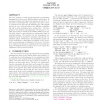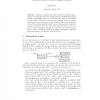33 search results - page 3 / 7 » Algorithmic Debugging for Lazy Functional Languages |
PEPM
2004
ACM
13 years 10 months ago
2004
ACM
Tracing computations is a widely used methodology for program debugging. Lazy languages, in particular, pose new demands on tracing techniques since following the actual trace of ...
PPPJ
2009
ACM
13 years 11 months ago
2009
ACM
Continuations, or ’the rest of the computation’, are a concept that is most often used in the context of functional and dynamic programming languages. Implementations of such ...
ICFP
2001
ACM
14 years 4 months ago
2001
ACM
The type systems of most typed functional programming languages are based on the Hindley-Milner type system. A practical problem with these type systems is that it is often hard t...
IFL
2004
Springer
13 years 10 months ago
2004
Springer
Abstract. Tracing a computation is a key method for program comprehension and debugging. Hat is a tracing system for Haskell 98 programs. During a computation a trace is recorded i...
CORR
2006
Springer
13 years 4 months ago
2006
Springer
Packrat parsing is a novel technique for implementing parsers in a lazy functional programming language. A packrat parser provides the power and flexibility of top-down parsing wi...


